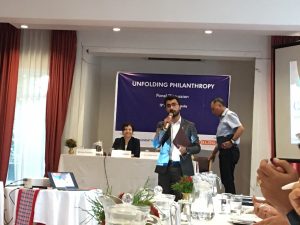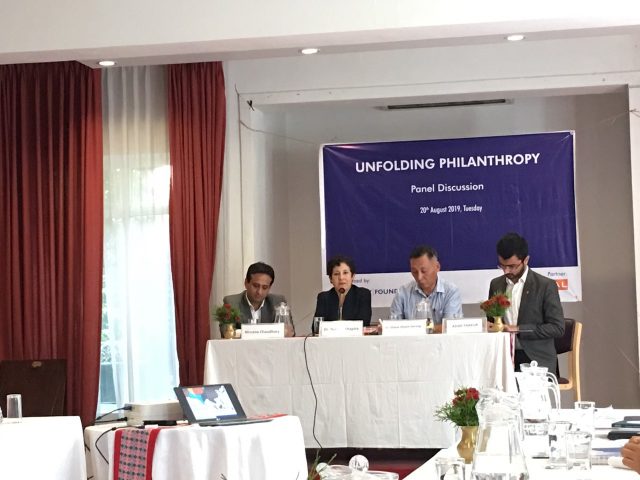Unfolding Philanthropy, a panel discussion held on 20th August 2019. The event was organized by Chaudhary Foundation where Glocal Pvt. Ltd. Co-sponsored the event. During the event panel discussion of Asian Philantrophy, conditions of Nepalese business houses were discussed. Dr. Ruth A Shapiro, Chairperson of Centre for Asian Philanthropy and Society (CAPS), Nirvana Chaudhary, Vice-Chairperson of Chaudhary Foundation and Dr. Ghanashyam Gurung, Country Director for WWF Nepal were present as Panelist and the panel discussion was moderated by Mr. Asish Thakur, Executive Director, Glocal Pvt. Ltd. In the event, representative from different organizations were present.
Philanthropy means charitable giving to human causes on a large scale. It is just not a donation but an effort an organization or individual puts their effort for welfare of the society. The concept of philanthropy is more or less similar to CSR (Corporate Social Responsibility).
Panel discussion began with the opening remarks of Ms. Merina Ranjit, Representative, CG Foundation, who expressed her gratitude being able to be there and discuss on the topic which is ongoing in rapid and impactful way.
Asish Thakur introduced the panelist and then started the conversation with remarks of panelist with the questions by Mr. Thakur.
Moderator: Can you give me your remarks on the basic subject of philanthropy and how do you understand it?
Dr. Ruth A Shapiro: CAPS is an independent action-oriented research and advisory organization committed to maximizing private resources for social good. In Asia philanthropist and families are involved in corporation unlike in west. In private sectors of Nepal, we have skills like accounting, HR, financial forecasting, strategic planning which in needed in non-profit sector and social enterprising. We need to understand what works best in Asia and is different from West. In Asia it’s normal for philanthropist to work with government and it helps to scale your innovation and thinking in away without their support which brings true system change.
Talking about the doing good for an index, the profound problem here is the trust issue. One organization not trusting other. Trust can be more accountable if there is transparency on monetary.
Moderator: How as WWF and challenged aspect of going good in Asia and in Nepal basically?
Dr. Ghanshyam Gurung: Philanthropic sector has grown a lot. Looking at growth in last 25 years, social sector, education, and health sector had grown but environmental sector has grown more. Talking about my sector, conservation sector needs investment and needs investment and it’s a challenge. The waste management in sea in bad and aquatic life is decreasing. That’s why I feel the waste management on land and undersea needs to be balanced and investment needs to be distributed effectively and efficiently. In totality, development has to be sustainable and there I see huge role of philanthropy coming into the CSR.
Nirvana Chaudhary: Representing CG Foundation- we have seen the requirement of support from private sector. We are driving to earn that much of wealth to be in a position of giving more to the society. That’s how our perspective have been changed.
We are contributing towards social entrepreneurship in Dolpo. For example during the earthquake in 2015 in Nepal we were able to react quickly and make schools into relief camp and distribute food and beverage. This is because we leverage the infrastructure that we already have and create impact. The real CSR which is sustainable is possible when we do research and collaborated effect also creates a good impact.
Moderator: Is Philanthropy or majorly CSR just about giving cheques and going beyond helping the society? Is it just giving to the society or this lies within the organization also?
Dr. Ruth A Shapiro: It’s all of the above. Before philanthropy was away from the strategy but now, companies are thinking about deploying volunteers, using expertise. The idea that we should help in every way possible not only in monetary but technological and intellectual resources.
Moderator: To Mr. Chaudhary, having the support in social entrepreneurs, what really matter when you think of what to support and how to support?
Nirvana Chaudhary: 25 years ago whoever used to come with the concept of doing good for the society, we used to support them but now we are changing our perspective. We have to be more focused and we started working on education then now we focus on impact investments. I want to grow our organization in such a level to help the people in need.

After this discussion, question/answer round was opened where audience didn’t only come with questions but also kept their view points.
Audience1: to Mr. Chaudhary, are you planning to develop experts in philanthropic sector as well, and be expert in it or hand over charity work to other agencies?
Nirvana Chaudhary: We know of policy and regulation that exist but we have been able to create our own bench marking way above the requirement from the country. As you said charity according us is something that is more than one time transaction. There is something we are good at but we don’t have enough knowledge, experience and enough wisdom in social space and we love the impact investment. We have been trying to identify the problems and work on it. You need interest, passion and determination to initiate, if you come up with it, we will love to be part of it.
Audience2: For DR. Ruth, youth have the tendency to fly abroad, so I expect you suggestion to retain the human resources. Then for Mr. Chaudhary, I have been working in water sector too. Till now we have 80% water borne diseases and we have only 17% people are getting safe water. Nepal being rich in water resources, why CG is not promoting water business and we haven’t been making bottled water from Rasuwa, Dhading. This type of micro small business can be promoted and human resources can be retained. How can we manage water in Nepal?
Nirvana Chaudhary: We make sure that in all our manufacture plant, we have Strong treatment system. We just invested in water treatment plant. We have investing in central western side at this point and trying to work in this field. Also if we knew about your idea earlier which is this sustainable we could have collaborate with you.
Dr Ruth: Regarding question about youth, in Hong Kong I see many of them working and saving money to return back to Nepal. If you have increasing development and if opportunity is created people want to come back and get involved. In this room also people have studies abroad and come back and have given back. The good thing is people returning back with skills, expertise and some capital to do good. Yes this is poor country and have less opportunities but have more opportunities n 2019 then there were in 20 years ago. So the trend is positive and constructive that is something to feel good about.
Audience3: What advice do you give to global representative students, NGO workers, people working for ruler development, about the use of DGI index survey into their daily work system? If you could elaborate little bit on that. It would be really great.
Dr.Ruth: The Doing Good Index is our policy study. So the primary constituency form of study is our government. So in tern of how it can be utilized by other organization, is in your conversation with government and as citizen to be promising that a lot can be done. And to help government and understand effective and efficient way to unleash this type of social investment. I think that 21 years old start their own business right after school, sometimes it works but often times getting real life experience first can be helpful in terms of development so that they can see the gaps, and develop the expertise to get the solution.
Audience 4: hearing everyone, something strike to my mind. So far myself being in private business sector, there are two type of business person, entrepreneur and a businessman. Doing good or being involved in philanthropic work, first business needs profit and some organization priority is more turnovers. Also there are some organization who are into achievements with neglecting social issues. I think we need to really differentiate the organization who are more into profit and philanthropy. Also in my opinion doing good will be impactful if small scale entrepreneurs are more focused since they are well professional business people and they will giving one day when they are satisfied.
The event concluded with networking session among the panelist and audience of the event.







